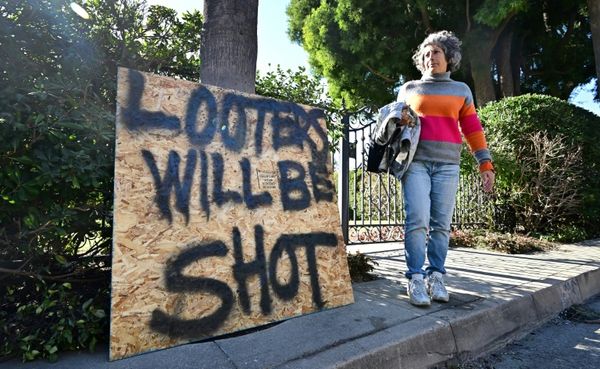Back in October 2017, 20-year-old Hongkonger Amber Poon Hiu-wing believed she was dating the boy she would spend the rest of her life with.
His name was Chan Tong-kai.
WARNING: Readers might find some details in this story distressing.
They had met while working together and began seeing each other soon after.
The pair shared their relationship updates on social media.
Poon once wrote on her Facebook: "He said I'm his first and last girlfriend."
The next year, the couple decided to celebrate their first Valentine's Day in Taiwan.
Despite frequently sharing their photos on social media, Poon was cautious to talk about their relationship with her parents.
She told them she was travelling to Taiwan with a friend but didn't reveal who the person was.
Poon was also three months pregnant at that time.
It appeared to be the perfect romantic holiday.
On February 16, the night before they headed back home, the couple bought a pink suitcase at the local night market and took it back to the hotel.
But it was the last time Poon was seen in public.
One month later, Taiwan Police discovered her body when searching the bushes in a suburban park.
She had been murdered by the very person she believed she would spend the rest of her life with.
By the time her body was discovered, Chan had already fled back to Hong Kong.
What happened to Poon?
One month after Poon's disappearance, Chan was arrested by Hong Kong police and confessed to killing his girlfriend.
He revealed the couple had started arguing as they packed their luggage for their flight back to Hong Kong the next day.
They paused the fight for a few hours, but it resumed in the early morning of February 17, 2018.
Poon told Chan she was still in touch with her ex-partner and showed him an intimate video of her with another man.
Chan, outraged by the shocking news, pushed Poon against the wall and strangled her to death.
Chan then folded Poon's body so it could fit inside the pink suitcase they had bought, while dividing her personal items into four plastic bags.
He kept Poon's credit card, digital camera and smartphone and then went to sleep until morning.
After he woke, he collected all the plastic bags and threw them away before taking the pink suitcase — with Poon's body in it — down to the lobby.
He was filmed on the hotel's surveillance camera as he left the hotel with the suitcase in tow.
Chan made his way to a station, hopped on a train and got off at a later stop. He hid the body in bushes at a nearby park and dumped the suitcase elsewhere.
He then withdrew $TWD20,000 ($956) from Poon's credit card with the intention of spending the money on some new clothes.
But in the end he changed his mind and headed to the airport for his flight back to Hong Kong.
How a murder case triggered mass protests and a political stoush
With the details provided by Chan, Taiwan police were able to find Poon's body. But a bigger problem emerged.
In ordinary cases, Hong Kong police could immediately charge Chan with murder, as he had confessed during the police interview.
But since Chan committed the crime in Taiwan, he would need to be extradited from Hong Kong to face charges there.
While the two governments did not have extradition agreements at that time, they did have experience in handing over criminal suspects that had fled from one city to another.
In 2016, after three murder suspects fled from Hong Kong to Taiwan, police in Taiwan asked the local immigration department to cancel the suspects' tourist visas, then used a Hong Kong-registered airline to deport the trio.
As a result, Hong Kong police were able to immediately arrest the three suspects when they landed at the airport.
This time, however, Taiwan raised the idea of the two governments making a formal legal assistance treaty, so that Chan could be arrested by Taiwan police in Hong Kong.
The problem was that in setting a treaty with Taiwan, the self-governed island would be acknowledged as an independent country by the Hong Kong government — a move that would no doubt infuriate Beijing.
At an impasse on the issue of a treaty, local politicians and legal communities in Hong Kong offered five other proposals to bring Chan to Taiwan for prosecution.
All were rejected by the Hong Kong government.
Instead, the government insisted on a "one for all" solution to amend its extradition bill to allow Hong Kong to send criminal suspects to countries and regions — including mainland China — that it didn't have formal agreements with.
But the proposal sparked public concerns that under the amended bill, Beijing could request for Hong Kong to extradite critics of the Chinese Communist Party.
Questions were also raised over the few notices and short period of public consultation before the bill went to a vote at the Legislative Council.
Taiwan ultimately rejected the amended bill as a solution, and the two governments appeared to have reached a stalemate, with Hong Kong insisting it was the only way for Chan to be extradited.
On June 9, more than 1 million Hongkongers marched on streets to call for a withdrawal of the extradition law amendments, kicking off the political turmoil in the city that has continued to this day.
When Chan finally faced court, it was on fraud charges
In April 2019, while Hong Kong was divided by the extradition bill amendments, Chan was sentenced for monetary fraud.
The charges were related to his use of Poon's credit card after the murder and he was sentenced to 29 months in jail.
After serving his time, he was released from prison in October 2019, when the Hong Kong government withdrew the extradition bill proposal after months of mass protests.
It was also the last time Chan appeared in public.
He asked for forgiveness from Poon's family and Hongkongers — who were caught in the political turmoil because of his crime — and vowed to head to Taiwan and surrender himself.
But Chan has still not turned himself in to Taiwan authorities.
Instead, he immediately moved into a safe house arranged by Hong Kong police, who cited concerns over his personal safety.
Two years later, he moved out of the safety house and was reported to be living in a suburban area of the city.
His guardian, Reverend Peter Koon of Hong Kong Anglican Church, told local media that Chan "never leaves the house", and "spends all his time playing video games and watching television".
The ABC has contacted Reverend Koon's office for comment.
As the pandemic spread through Hong Kong, Reverend Koon described Chan as so isolated that he "couldn't take COVID vaccines", and had to rely on food delivery.
Uncertainty over where to next in the case
Chan has become a hot potato that neither the Hong Kong or Taiwan government want to touch.
The Hong Kong government declared Chan was "a free man" after his release from prison in 2019 and could turn himself in to police if Taiwan's immigration department issued him a tourist visa.
But Taiwan's government said it was impossible for them to issue a tourist visa since there was already a warrant out for him as a murder suspect.
Instead, they have insisted on reaching a legal assistance treaty with Hong Kong, which would allow Chan to enter Taiwan as a murder suspect in police custody, rather than a tourist.
The suspension of travel due to the COVID pandemic has also made it difficult for Chan to enter Taiwan as a tourist.
But from next week, Taiwan will resume travel from Hong Kong and Macau, and the question of whether Chan will turn himself in to Taiwan authorities is already dominating local headlines again.
In a statement to the ABC, Hong Kong police force said "the most direct way of resolving the issue" is Taiwan authority allowing the entry of Chan into Taiwan "as soon as possible [so] that he could bear his legal responsibility".
"As soon as the Taiwan authority approves Chan's entry into Taiwan, the police units of Hong Kong and Taiwan can proceed to discuss relevant arrangements to enable Chan to surrender himself in Taiwan."
However, the Hong Kong police force declined to comment on whether Chan is still under police protection, citing "confidentiality considerations".
Taiwan's Mainland Affairs Council, which oversees matters with Hong Kong, told the ABC in a statement that Taiwan had "repeatedly" called on the Hong Kong government to respond to their request of legal assistance, but "Hong Kong government has again avoided it".
"[Taiwan government] has repeatedly stressed its hopes of trialling the suspect, achieving judicial justice as soon as possible, and healing the grief of the victim and her family," said the spokesperson.
"Yet Chan is a murder suspect who absconded back to Hong Kong after committing the crime. Coming to Taiwan to surrender is not simply a matter of visa approval, but it involves the exercise of the jurisdiction of both parties and related public powers."
Five years of torture for Poon's family
Thomas Kellogg, the executive director of Georgetown Centre for Asian Law, said both Hong Kong and Taiwan authorities should take proactive action, given the case has dragged on for five years.
"Amber Poon's parents deserve justice in this case, and so it's the responsibility for both the Hong Kong and Taiwan government to resolve whatever barrier is there, and move forward to prosecution," he said.
For Poon's mother, the past five years had been torture.
In February 2021, Poon's mother mailed a pink suitcase — one that looked similar to the one her daughter's body was hidden in — to Chan through Reverend Koon, to remind him to surrender himself.
Later in October, she hosted a press conference demanding to meet with Chan and Hong Kong government officials.
She also criticised two pro-Beijing lawmakers who she claims "lied" to her to gain her support for the extradition bill amendments, but soon abandoned her once Chan was released from jail.
Neither Chan nor Hong Kong government officials met with Poon's mother.
While Poon's death triggered political wrestling between Beijing, Hong Kong and Taiwan, its nature as a tragedy of relationship violence is rarely discussed in local media.
According to Linda Wong, a Hong Kong barrister and advocate for women's rights, Poon's case has highlighted gaps in the system.
After a series of murders against women in 2004 and reports of police failing to intervene in domestic violence, the Hong Kong government revised its Domestic and Cohabitation Relationships Violence Ordinance in 2008.
Under the regulation, people who are harassed and assaulted by someone they live with can seek an injunction to ban their predators from entering their households.
The ordinance was revised again in 2010 to ensure same-sex spouses would be protected under the law.
However, the regulation only provides civil remedies, and for cases like Poon and Chan — who were dating but not living together — protections are limited.
Gina Tam, associate professor of women's and gender studies at Trinity University, said Poon's case also demonstrates governments are "capitalising" on domestic violence.
She said Poon's experience — and the difficulties her family has faced in seeking justice — was not unique to Hong Kong or Taiwan, but mirrors a global dilemma faced by all victims and survivors of domestic violence.
"On one hand, she was poorly served by the legal protections that existed," Associate Professor Tam said.
"But even if that extradition bill had passed, she would not have been well served — all that would do would make it so that [Chan] could stand trial, but it's very difficult to get that kind of justice.
"And frankly, the better justice for her would be to be alive."







